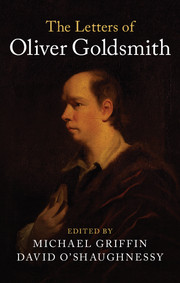57 - To John Nourse, [London, 26 April 1773]
Published online by Cambridge University Press: 12 December 2024
Summary
John Nourse (bap. 1705, d. 1780), bookseller, specialized in language books, contemporary foreign literature, and scientific books. Based at the Lamb without Temple Bar, near the Strand, he would become bookseller to the Society for the Encouragement of Learning and then bookseller to the king, 1762–80. Not only was Nourse's shop an important venue for scientific discussion in London, it was an important node in the Enlightenment republic of letters; he had trade connections in Paris, The Hague and Leiden. Nourse disseminated key English texts abroad and published translations of significant European authors for British audiences – notably Voltaire. William Griffin had been forced to sell his interest in Goldsmith's History of Earth, and Animated Nature (for which he had already given £500 to Goldsmith by way of advance) to Nourse, who eventually published the eight-volume work on 1 July 1774.
Here Goldsmith is providing an aspiring author with a letter of introduction, an indication of Goldsmith's status – or, at the very least, his perceived status – among London booksellers. John Andrews (1736–1809), historian, would become best known for his History of the War with America, France, Spain, and Holland, 4 vols. (London: Printed for John Fielding and John Jarvis, 1785–6). The History of the Revolutions of Denmark, the text referred to here by Goldsmith and which Nourse published in April 1774, was his first publication. The introductory note ‘To the Reader’ observes: ‘Denmark having by the remarkable Events which happened in that Kingdom, during the Course of the last Year, attracted the Attention of all Europe, and particularly of the British Nation, from the Family Connexion subsisting between the two Crowns’ (1) makes clear that Andrews was exploiting interest in the shocking events surrounding the divorce and expulsion from Denmark of Queen Caroline Matilda – sister to George III – in 1772, events which captivated the British public. Goldsmith's interest in Andrews's book may also have been piqued by his personal recollection of King Christian VII's visit in 1768 and the masquerade for which he sought tickets for the Hornecks (see Letter 26).
- Type
- Chapter
- Information
- The Letters of Oliver Goldsmith , pp. 128 - 129Publisher: Cambridge University PressPrint publication year: 2018

